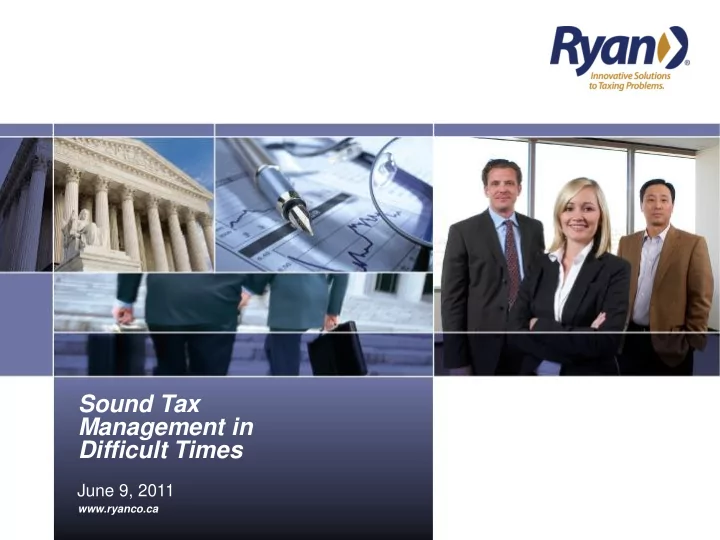

Sound Tax Management in Difficult Times June 9, 2011 www.ryanco.ca
Sound Tax Management in Difficult Times Rod Butcher, CGA, Director, Sales Tax Advisory, Ryan ULC
Outline: 1. Commodity tax management 2. Assessment avoidance 3. Assessment mitigation 4. Payroll tax management 5. Property tax management
Commodity Tax Management • GST/HST/QST are each recoverable taxes for those in the private sector • Rates are: – 5% : Alberta, Manitoba, Saskatchewan, PEI and the Territories – 12% : British Columbia (currently) – 13% : Ontario, New Brunswick and Newfoundland & Labrador – 13.925% : Quebec (combined GST and QST) – 15% : Nova Scotia • Loss of credit for tax paid to suppliers or on import is both a cash and income hit
Commodity Tax Management • Point of capture of the tax is at the weakest point in the organization • Accounts payable staff usually entry-level • Automation rarely possible except for employee expenses and allowances
Commodity Tax Management • Establish a project to back-comb through payables to recover missed tax • Obtain flat file from IT of posting detail • Filter for exceptions • Investigate source documents for potential recovery • Automate employee expense reports and allowance payments using CRA/MRQ-approved factors • Educate staff regarding posting routines
Assessment Avoidance • New HST: – Where large businesses have operations in Ontario or BC, restrictions apply to recovery of provincial component of tax on fuel, automobiles, telecom, energy and M&E – Penalties to apply if RITCs not observed – New billing rules for services and intangibles – invoice based on address of recipient, not where service performed – Transitional rules observance – New pension plan rules
Assessment Avoidance • Lack of export documentation for GST/HST/QST • Lack of supporting documentation for input tax credits • Insurance placed through non-resident broker/insurer • New pension plan rules • Not remitting on taxable benefits for GST/HST • Not observing restrictions on recovery of GST or QST • Failing to remit QST on insurance • Incorrect use of 4.5% QST expense reimbursement factor • Retail sales tax and computer software • Retail sales tax and imports/inter-provincial transfers • Retail sales tax and insurance provided by non-resident (e.g., through parent) • Failure to collect tax as appropriate
Assessment Mitigation • Contest extrapolation based on sampling – Population – Sample size – Period • Determine if customers self-assessed • Invoice customers for tax assessed • Examine wash transaction relief for GST/HST/QST • Voluntary disclosure
Payroll Tax • WSIB/WCB premium rates – reductions following business reorganization • Payroll allocation – re-allocations among business units/jurisdictions • Consolidated payroll reporting – check for errors after change to shared/central payroll ops
Property Tax • Property classification – reductions following change of use • Tax application rebates – vacancy, demolition, renovation, etc. • Assessment values – contest through reconsideration or appeal
Sound Tax Management in Difficult Times Thank You!
Recommend
More recommend